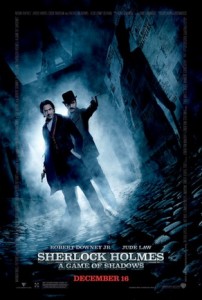 The great Hans Zimmer is one of the most recognized soundtrack and score composers of all time. He’s done the score for “Inception”, “The Dark Knight”, “Angels and Demons”, “Gladiator”, and over 90 other films. The thing about Zimmer is that every score is even more unique than the last. “Sherlock Holmes: A Game of Shadows”, is a perfect example of that.
The great Hans Zimmer is one of the most recognized soundtrack and score composers of all time. He’s done the score for “Inception”, “The Dark Knight”, “Angels and Demons”, “Gladiator”, and over 90 other films. The thing about Zimmer is that every score is even more unique than the last. “Sherlock Holmes: A Game of Shadows”, is a perfect example of that.His other scores are usually focused on dark and massive bombardments of sound, while this one is often centered on whimsical and high tempo jigs, yet still occasionally throwing in more of that monumental and epic material. This is prominent on the first half of the album. The first half is mostly reorchestrated and rehashed pieces from the main overture of the first film’s soundtrack. This is usually fine, but to do it to the extent that he did on this album is simple laziness.
The second half is significantly more original, with tracks that stand out like “To the Opera!” which is a delightful blend of operatic singing and huge, pounding hits of the orchestra. “Two Mules For Sister Sara” is another song on the album that caught my attention. This song is a piece from Ennio Morricone’s soundtrack for the film of the same name that stars Clint Eastwood. This track also increases my curiosity as to how it will be used in the film, seeing as it is a strange choice for a movie set in old england.
The end of the soundtrack features a more traditional Zimmer sound, with the usual high tempo, dark, and explosive feel, that will probably be used for the climax of the film. My interest in the film is also sparked by the titles of some of the tracks like “Memories of Sherlock” and “The End?”. The first has a reflective feel to it, with a kind of slow and disturbed piano arrangement. The latter is basically a carbon copy of the track that ended the first film, a completely fast and energetic version of the overture.
I can safely say that this album has it’s moments. There are times when I felt like it was a little dull and lazy, and there were others where my blood was pumping and thoughts of chase sequences and gunfights raced through my head. The songs were good in that respect, that I could imagine a scene simply through the music, but mostly, they were something to be desired. It is fair to assume that Zimmer can’t have a mind-blowing score for every film, and on this one, it certainly was good, but not up to his standards. I give this album a 3 out of 5.





![Varsity Baseball Defeats CBC [Photo Gallery]](https://FHNtoday.com/wp-content/uploads/2025/04/IMG_0523-1200x800.jpg)


